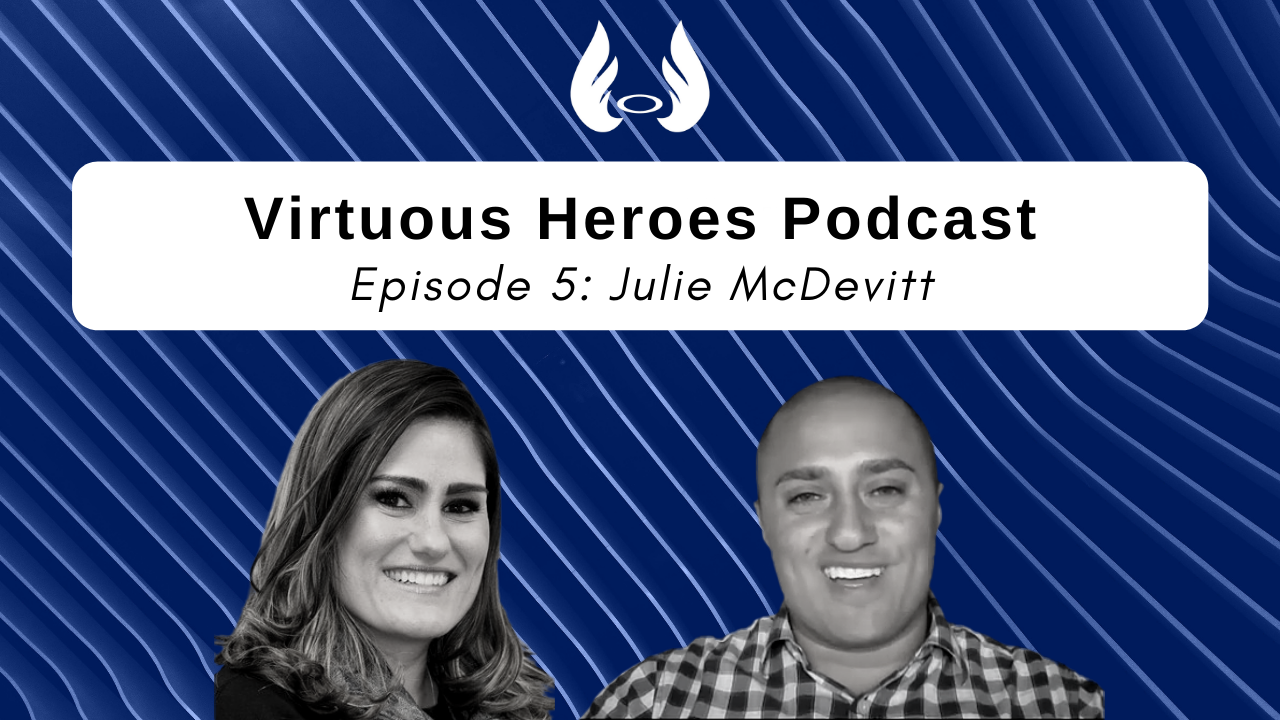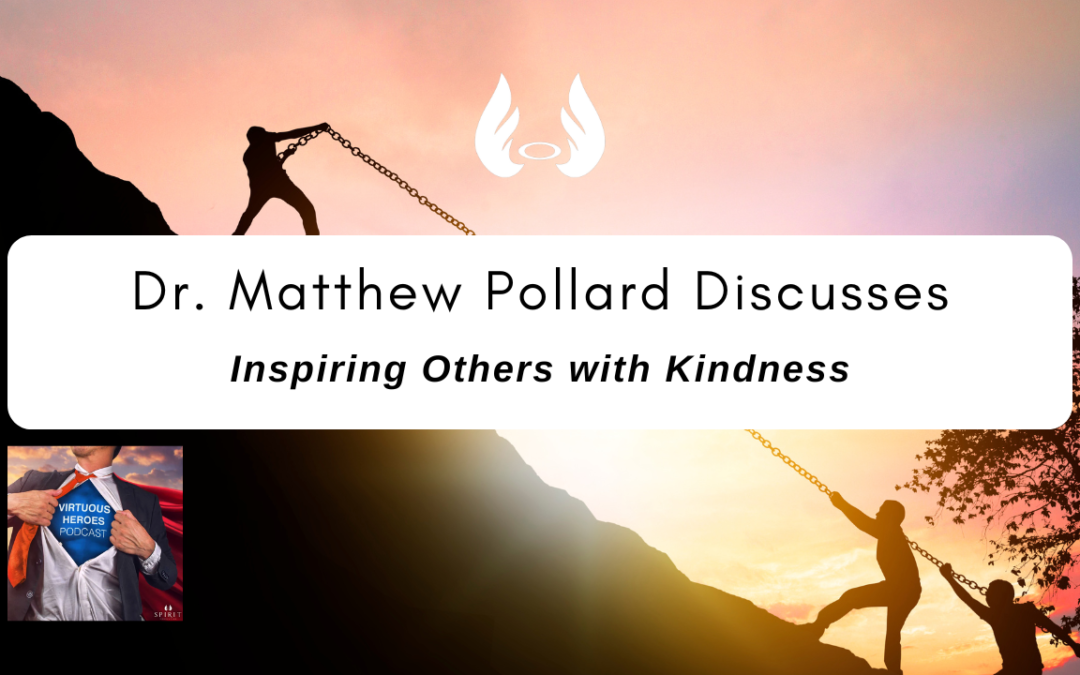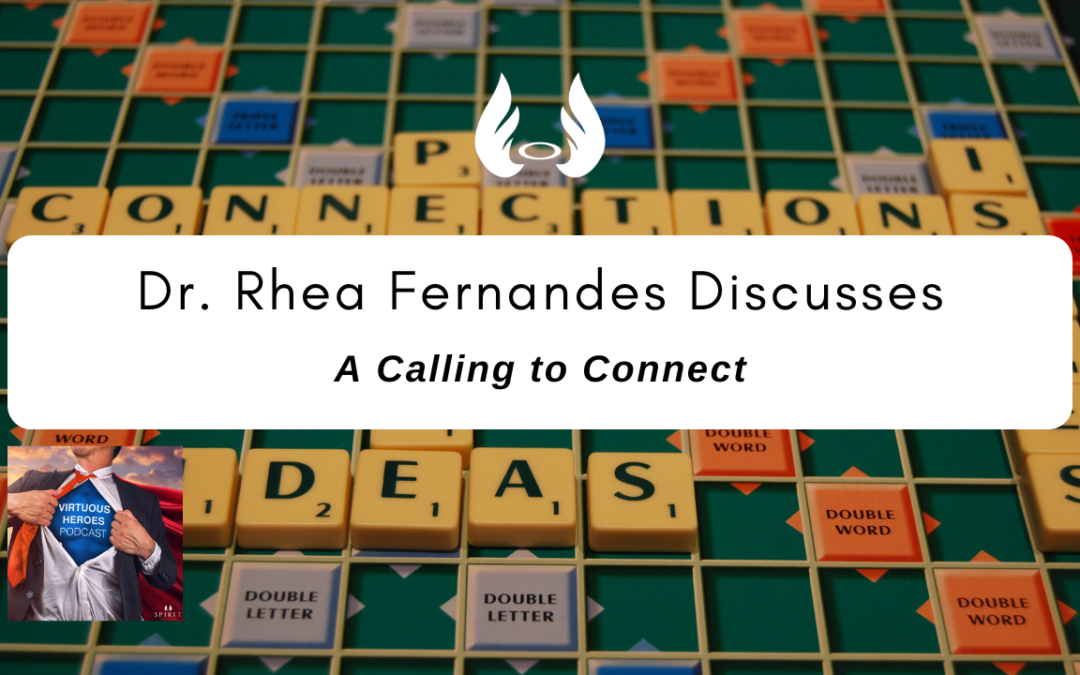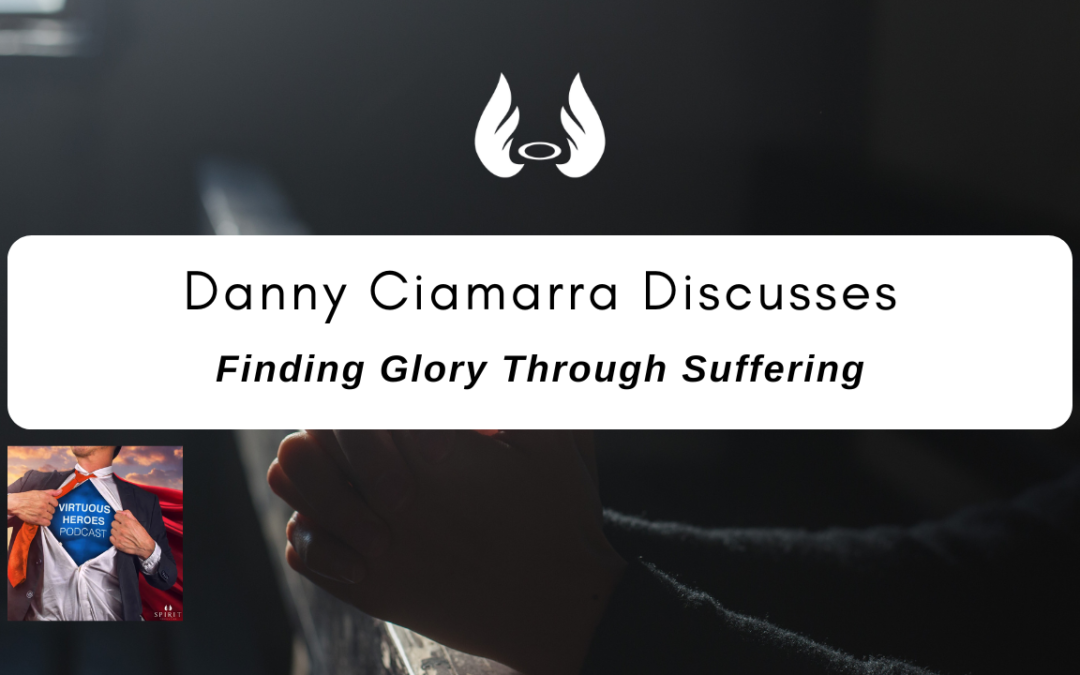Podcast episode
About our Guest
Julie McDevitt is the Founder and Clinical Director of Grace Integrated, LLC., a professional mental health counseling and psychotherapy private practice for individuals, groups, and families in the western suburbs of Chicago. In this episode, Julie talks with Chris about the value of mindfulness and creating a strong culture within an organization. Inspired by her background in teaching and work in therapy, Julie describes the importance of empathy to best serve clients’ needs. She is also a wife and a mother.
EPISODE TRANSCRIPT
Chris: All right. Excited today to have Julie McDevitt on the Leading Virtuously Podcasts. Hello, Julie, how are you?
Julie: I’m great. Thanks for having me, Chris. I’m excited to be here to talk with you this afternoon.
Chris: Excellent. Who are you?
Julie: That’s a. Interesting question. I think when I identify, I think about being a wife and a mother definitely are my primary roles.
And then I also run an organization called Grace Integrated, and it is a counseling facility. We have a couple of different locations in the Western suburbs of Chicago and we really work hard to bring therapeutic services to people of all ages and genders and walks of life.
Chris: So when you say therapeutic services, is there a specific, like area of therapy that you guys focus on?
Julie: We actually, I came as, from the background of being a teacher and then I always consider it like this. A lot of therapists will really concentrate in one area. When I was a teacher, I was trained that I had to be able to meet whichever student’s needs was in front of me. So I couldn’t just do visual learning or I couldn’t just do auditory learning.
I had to be able to compliment whatever that person’s needs were that was in front of me. So I really encourage my clinicians to have a really large skillset so that we are able to meet the needs of many different people with many different problems. And concerns as they show up at our door, we do definitely concentrate in family and children.
We talk a lot about that just as that’s my background, I’m a marriage and family therapist. That was my degree. It’s definitely where I have the most experience and knowledge while we really work hard to help whoever it is that calls, and is looking for help.
Chris: Sure and people have problems. Yeah this is probably the most interesting time to be a therapist.
And I think you’re being very humble about the way that you communicated Grace Integrated. I know you guys have been steamrolling growth. What do you think has been the secret to your success?
Julie: Yeah, I think we have. I don’t want to under estimate or understate that because we’ve worked really hard.
I’ve worked really hard. My husband who runs the organization with me, my sister, who also does all the intake, all of us have put in a lot of the footwork to get where we are while I know that we come with this idea of family first as we are a family, literally. Anyone we bring into the organization. We want to treat as a family, but I’ll joke with them like a functional family.
We want all the aspects of family without the dysfunction that most families have on some level. And so I think my clinicians who come in really feel that they feel like they are our priority. We really put them first and their needs first because they are, we as the therapist, we’re the tools in which we take and help our clients.
And in order to be the most, the sharpest, the most effective tool, we have to be able to have this like safe place to land a community around us, a lot of encouragement and support because the work is extremely hard. And that is, I think a lot of our successes that our clinicians really benefit from our investment in them.
And so they are able to go out and then provide services that it’s undeniable, like they’re really strong clinicians. And they’re also excellent people like in my December newsletter, I just really expressed how humbled I am with the quality of people who have decided to choose us too. They really are like, I cannot speak enough about the quality of my clinicians.
Chris: That’s excellent. That’s excellent. And yeah, I think that’s interesting that obviously I know your your husband, your business partner, who is your business partner is as well as the person that’s running your operations. My other sister, Jenny, and you guys are all very loving people.
I think that’s great to be able to bake into your company culture as well. And it’s also, from me having my background in recruiting and executive search of like, when you’re looking for people like, Hey, are there. Are these people that we look at as a family member, and it’s a good sniff test for bringing them into the organization as they now know this is not going to be a fit.
So the other thing I wanted to ask you, Julie, is, you guys are now coming up on your fifth year, you guys been doing this for four years. Can you tell us for those that are entrepreneurs that are like, maybe still doing the moonlighting hustle, but are like, contemplating about just making the full-time jump.
Can you tell us about that story and why you made the decision to actually leave doing this as a side project and actually making a full-time gig?
Julie: Of course. Yeah. That was a really defining moment. I think in the life of my family, as you notice my husband and I run this business together and I was leaving a job in which I was unionized.
I had a really secure. Payment plan. I had a pension, I had all these things that people really see to feel okay. And it’s the question became like, can we make this jump and leave those things? That, those false sense of check marks of okay, we’re okay if we have the pension. We’re okay. If we have the secure job, we’re okay.
And it’s actually, if we depend too much on those things, we get really locked into where we’re at in life. The ability to grow and be an entrepreneur is to recognize that those aren’t actually, what make you a success or safe. It is connecting to these people like Chris and I have. Incredible relationship in which I really could get to this idea that it was like really, if we have nothing, if we sacrifice all of that, it’s not actually what makes us okay.
It’s like knowing that we could be in this small, we could lose all the stuff. And if we have each other and our beautiful, healthy children were completely okay. And so it was combining that mindset with the yes mindset. You have to have this drive, this passion in this, like the yes. You just say yes to everything.
So many people warned me of be hesitant or be mindful of this and don’t do that and don’t do this and don’t, and it’s I said, that’s fine, but I’m just saying yes to everything. I am going to panel with this insurance that you say I shouldn’t panel with, I’m going to rent this space that you think might not be the right location.
I’m just going to keep pounding away and saying yes to all these opportunities. Because if you have that support network, you know who you are, God is right there in the center of all of it. It’s you don’t need all this other stuff. It’s like just a false sense of security. We just thrive to find as humans.
And if we can just acknowledge that’s not actually what makes us okay. Then we can make these incredible jumps and you can only really get to where you’re supposed to be. Like your highest level of functioning. If you’re willing to gel.
Chris: Yeah, so you it’s like you have to start getting comfortable in the uncomfortable and that the more you challenge yourself to be sitting in a position where you’re uncomfortable, the more that you’re growing and learning and it seems like. As you’re mentioning, as you get older, it’s like that, that like that willingness to be sitting in a position of uncomfortability.
I don’t even know if that’s a word, but anyways, like when you’re sitting in that place, it’s it’s not always the easiest, but in essence, like that’s when you’re really growing. And so thank you for sharing that story. And I hope that’s a, definitely an inspiration for our leaders as well. So you know, this, I was going to ask you the question about where virtue and business intersects for you.
Some people have looked at that question is maybe you’ve been with people that don’t do things virtuously in a business setting, or is it, an opportunity where maybe there’s an opportunity to make money, be the motivator behind your actions. And instead you chose to take the people, focus the loving approach.
So where does business and virtue intersect for you, Julie?
Julie: Yeah, I think when you make money and earning the center of your organization, The people around you sense that, and they know that’s really what you’re prioritizing, and that will permeate your organization in a way that’s really unhealthy.
And it’s not actually what will bring you joy as the leader of that organization. And so the virtue intersects in that the relationship with God comes first. When we can make, create this really personal relationship with a higher power or who I choose to call God, I’m able to then connect to others.
And when God’s at the heart of things, it’s really hard not to have integrity because you’re so sensitive to when you’re being immoral or when you’re being unethical or when your purpose and you’re distracted by the wealth or the power or the I don’t know, when you have that relationship with that at the center in core, you become really sensitive and mindful when you’re doing those things.
And that is completely perceptible to those around you. And they don’t want to be around it. They seek to go elsewhere, seek to be in places that they feel that your priority is that integral. The moral soundness that you’re operating from a place where you’re putting those humans first and their needs first.
And when you do that, they’re going to show up on time. They’re going to work hours that you didn’t ask them to. They’re going to produce things that you’re just blown away by because you’re nurturing them in the same way. They feel that God presence, even if they don’t believe in God or knowledge, God.
That’s what they’re sensing. They feel that palpable energy and I know what it is. I’m not fooled by it. And so it’s the virtue of that. Like where I don’t worry about this person has to take leave because of this or this person, whatever the human. Barriers can be sometimes to working because I say go and do that, go and have your life, enjoy these other elements.
Because when you do that, they’re healthier and stronger and vitality will just pour right back into your organization. So I don’t fear, God is at the center. God is the source. And when God’s the source, it’s unlimited.
Chris: Yeah, no, I love that. I, the thing that you said that I think I still like really hung on was like the presence, when you’re in a state, when you feel like you’re in a good mental head space and you’re leading and you’re taking care of people that people resonate to that.
And so I guess I’m just curious, obviously you and I are both Christians, but other people may not, term God to be that way for those that, that aren’t maybe have that relationship with God in that sense. Are there things that you recommend to your maybe atheist clients or non-believing clients on how to help them find their center.
Julie: Yeah, I think the catch phrase or concept today is mindfulness. There’s a lot of activities that help people be mindful and we use the senses to be mindful. What do you see in the room? What are, if you smell something fragrant, if you like, touch, these are all things that like put you in your body, clear away the distractions in your mind, put the phones away.
And that quiet and stillness when you can really just ground yourself and be in your body is where we sense God, God lives within us. And so it’s people like to the struggle a lot of people have is they equate religion. They’re they’ve been offended by a religion, or they’ve been offended by a person who has taught them religion.
And they think that’s God, or they equate that to God and that’s not God. So I really encourage them to revisit of relationship to that life source, that higher power by being in their body, use mindfulness, be still be in your body, connect to it. And in those moments, you start to feel the peace and calm.
When you sit with yourself in the breath and you stop distracting yourself. And everyone, I think has an instinct of God and they just have been prejudiced in some way or another. And those are real pains. Those are real offenses and I don’t minimize them. They are hurtful and they need to be healed and.
I’ve really tried to be gentle in that and non judgemental because I don’t know, like I never experienced what they experienced because if we did, we don’t know how I would behave if I had that wall. So it’s really important to me as a Christian to, I might be the only Catholic they meet the only tolerant loving Catholic in terms of I’m leading with love.
That’s what Christ taught me. And that’s the only thing that always helps me try it again. And so people really need to feel that love before they’re going to trust the process. And so that’s what I want them to feel in the room. Again, going back to once they sense that energy that’s God, it’s undeniable.
Chris: Beautiful. Thank you for sharing. So two more questions. First is what has been the most. Foundational or life-changing both that you’ve read and why. And then we will ask the closing question.
Julie: I just picked up Rediscover Catholicism Again by Matthew Kelly. I love his work. I find it extremely accessible and practical.
And he talks like right away about. Either Jesus was like the biggest liar that ever walked the earth, or he is the Messiah, that you can’t deny his existence with all just like the factual evidence of him. And it just really made. It presented it to me in a way that pushed me to think. And I think any good book that you read, even if you don’t agree with what the book is telling you, it should push you to think about the words that it’s telling you.
And Matthew Kelly will also say show me your bookshelf, show me what you’re interested in. And I’ll tell you what kind of life you have. It’s just these, he gives these lines that really make me evaluate how I live. The culture in which we are embedded in. It’s a challenge. It’s a real challenge to stay focused and discipline because we have infinite amount of distractions today.
And I fall into them and I love his work because he’s gentle. He’s all the things I just described. And so I would start, I encourage a lot of people to start with that one, that text, because. Millions of Catholics that don’t know what tools they’re leaving and not picking up on a daily basis.
And so I really just encourage them to rediscover their faith.
Chris: Excellent. Thank you for sharing. Julie, how can people get ahold of you and the work that you guys are doing at Grace Integrated?
Julie: the best way is through our website. So it is graceintegrated.com. And we have all our staff bios there.
Just a little bit of the history and our phone number. It’s a great tool to explore, especially if your anyone’s thinking they might want to talk to someone, we’re here just to listen. And I think a lot of people really need that outlet today.
Chris: And then the last thing that we talked about offline that I thought that was very beautiful, that you said was about Insurance.
I know sometimes people find the barrier thinking like we’re already stretched then how are we going to make this work financially? And that oftentimes I know, even for us one of our kids is actually at Grace Integrated with one of your therapists and we actually pay nothing.
And so that’s just something. So can you speak to that about the insurance piece too.
Julie: Sure. Yeah. That was back to my answer about the, yes. A lot of people say. Don’t take this insurance or don’t do that. And I thought, I don’t want a single person to have barrier to services that genuinely need the help and need someone to talk to and to come.
Our facilities are gorgeous. Jen does amazing work with Chris and Sarah Schatz Berger to set up these just inviting lovely spaces. And I want people to be able to come into them and feel like they’re in their living room, just like having a cup of coffee and sharing. And so we’re in network with most major insurance companies, we’re in network with Medicaid and Medicare.
So I’ve really made sure that we can provide services to people who have all walks of life. And, we’re insured in such a many different ways today. Tried to remove that barrier for services.
Chris: I appreciate you sharing about your business and giving us the shot in the arm to make that jump.
And then also to once you’ve been able to speak about, about mindfulness as well, I know in today’s world with so many distractions, we need the ability to slow down and to go back to our roots. So appreciate it, Julie, thank you for being on the show today and look forward to continuing the dialogue.
Julie: Absolutely. Thank you for inviting me.









0 Comments